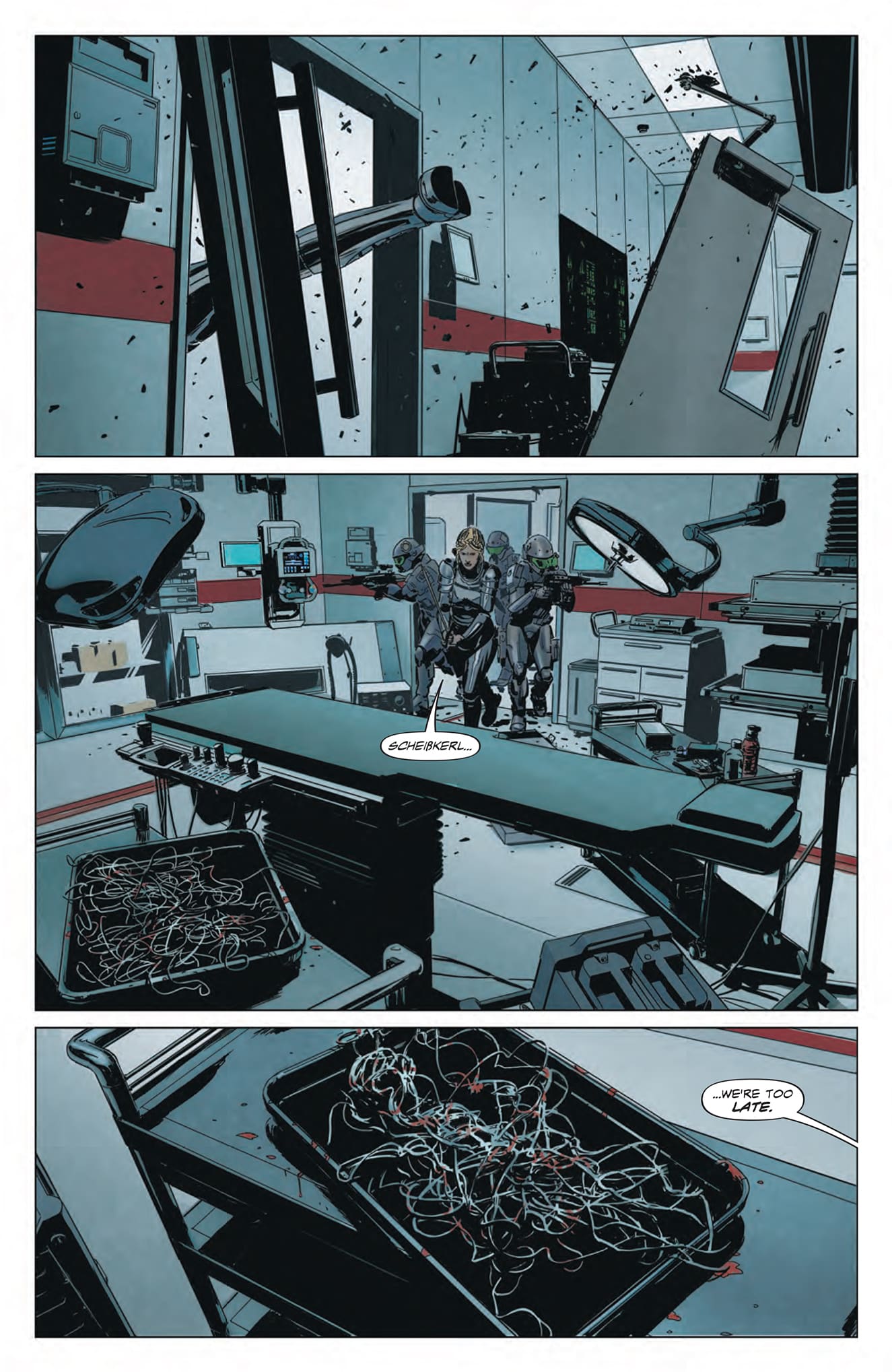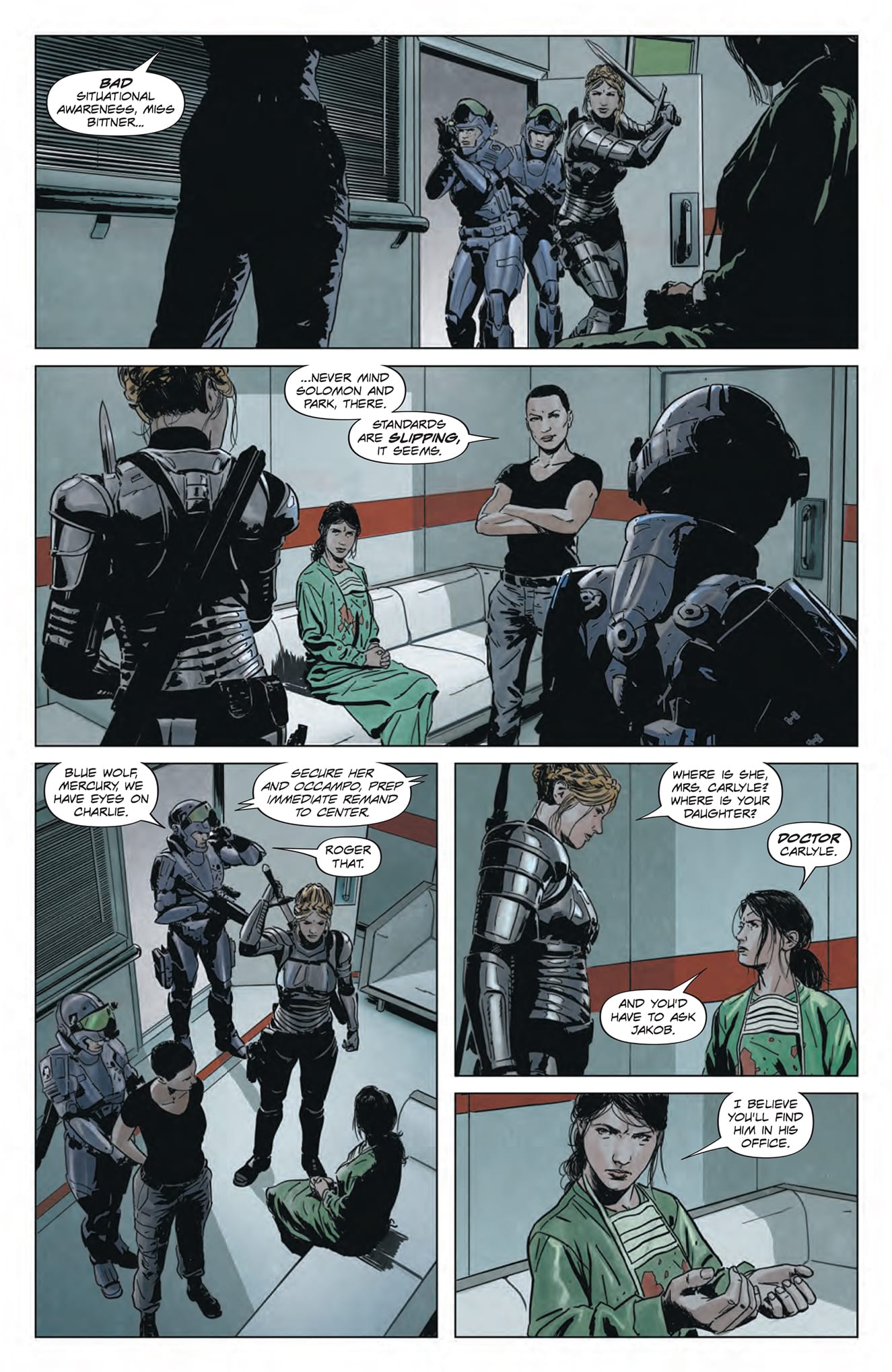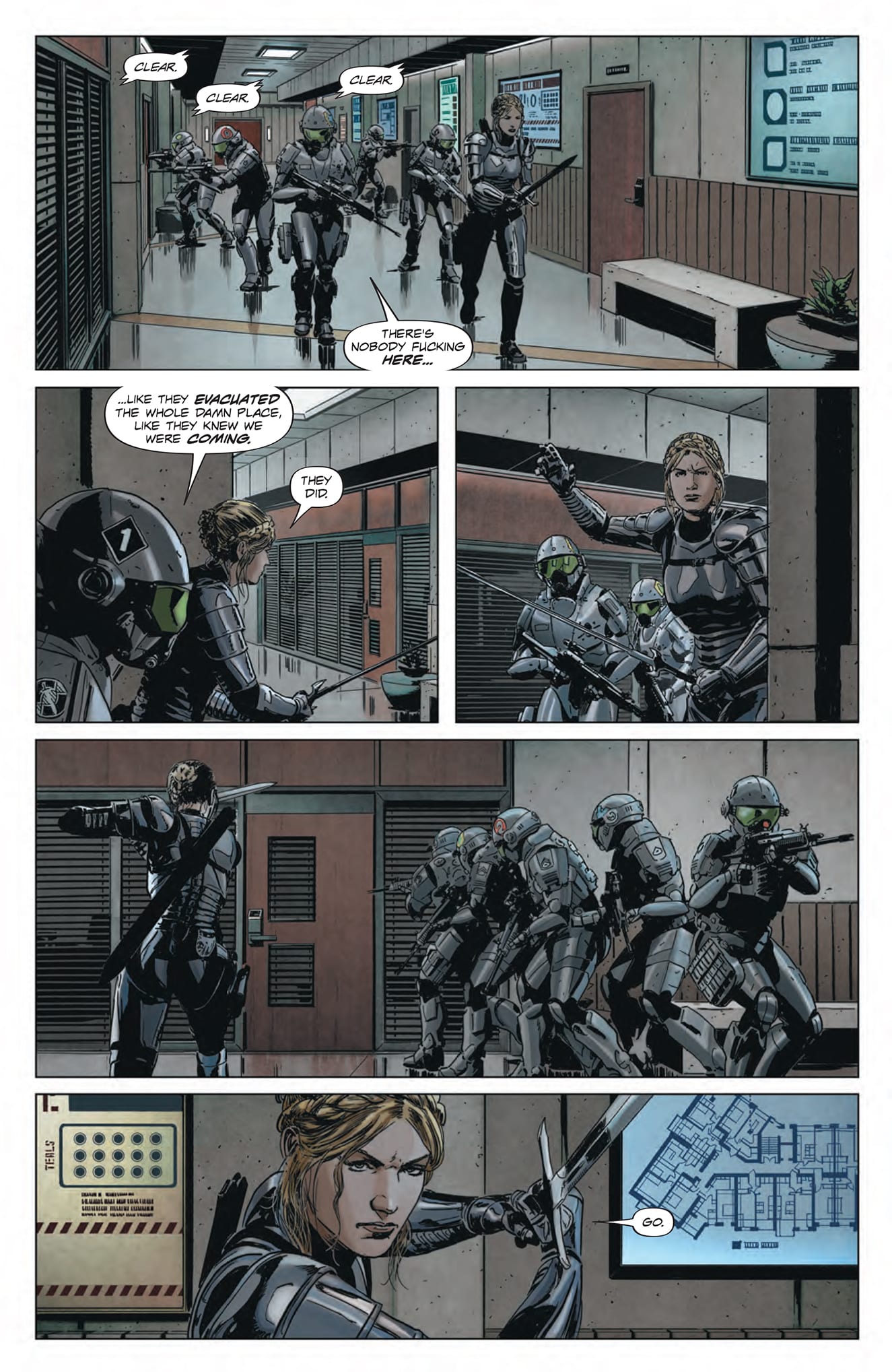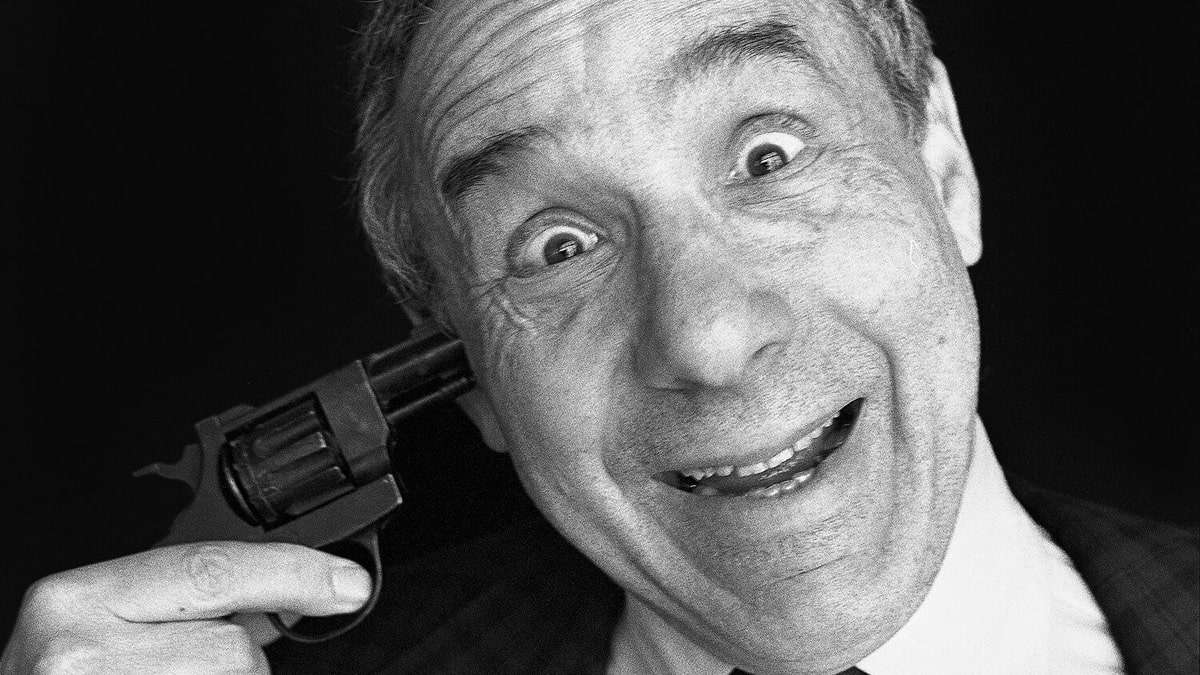Lazarus: Fallen releases June 25th, 2025, from Image Comics. The brand-new miniseries will conclude the long-running and much-beloved series by Greg Rucka and Michael Lark, which has spanned over a decade of comics. Smart, exciting and explosive, the series remains one of the strongest showings from either creator’s career, as they work in perfect sync with each other to tell a gutwrenching and exhilirating story about family, purpose, and fighting against the powers that corrupt the world.
With the story of Forever Carlyle now coming to an end, we at The Beat sat down with the series’ incredible creative team to reflect on Lazarus, its legacy, and the process of bringing it to an end.
This interview has been edited for clarity.
JARED BIRD: How does it feel that after 12 years, Lazarus is coming to an end?
GREG RUCKA: I’ve got some trepidation about it, honestly, mostly about our ability—or I should specify, my ability—to stick the landing. But this was always intended as a closed story in that it was always Forever’s story, and her journey is reaching its inevitable conclusion. When we started, I always knew how it would end, even if I wasn’t always certain as to how I would get us there. So, there’s a great satisfaction in that, at least, in reaching the conclusion of this journey that we’ve been on since 2013.
MICHAEL LARK: Well, it still feels a ways away. As of writing this, I’m about halfway through the art, but there is still quite a bit to go. I’m sure Greg has plenty of surprises in store for me.
BIRD: Forever has changed and evolved so much as a character since the beginning of the story. Are you happy her character has resonated so much with readers?
RUCKA: Absolutely! Very happy and…being honest, I never know what will necessarily connect with the audience, and what won’t. So, the fact that there are readers who are so invested in her story—in who she is, and where she has been, and who she has become—of course I’m happy. How could I not be?
LARK: I think there is a universality to Forever’s journey. She’s discovering that the world is much more complex, much less black-and-white, than she thought it was when she was younger. She’s also discovering that SHE is much more complex than she thought she was. And I think those are things that anyone with any self-awareness and critical thinking skill can relate to.


BIRD: One of my favorite elements of the series has been the redemption of Jonah Carlyle. Greg, what was the process behind that like?
RUCKA: Okay, so that’s great to hear. Jonah started as such a legitimate, selfish, piece of shit, but he was who he was because of his environment, his experience, his circumstances. He was raised to be selfish. I’m leery of using words like “redemptive,” but I do think it’s important to tell stories about how people can change, how people can learn, for better and—and we’ll see this in the upcoming issues with at least one other character—worse. But in the same way that Forever’s story has been about her education, so to speak, about her learning the truth of the world and her responsibilities for and in it, Jonah needed to learn empathy. He was born and raised into an environment that argued—as fucking Elon Musk has been arguing, for what little the drivel that comes out of his mouth matters—that empathy was a flaw, not a strength. A lack of empathy—a learned lack of empathy—is necessary for oppression. So, Jonah’s journey, a journey where he was placed in circumstances that allowed him to not just suffer, but to understand the incredible suffering of others…yeah, it’s radical therapy in his case, but the therapy seems to have taken. Hopefully, we’ve been seeing something similar with Johanna, but along a separate, and more subtle, track. She’s changed, too, and in both of their cases, they’ve been changed by exposure to the world outside of their bubble, to people they never knew, and circumstances they never imagined.
LARK: Although this question is for Greg, I’m going to chime in here. I absolutely loathed Jonah, and his twin sister Johanna, when we started this series. I didn’t even like drawing them. But, as the series has progressed, they’ve become two of my favorite characters. Especially Jonah. Once again, I think Jonah’s journey is something that most people can relate to. He had to be taken out of his bubble, he had to go into the world and see how other people lived, and he saw that the world was not what he thought it was. That triggered his growth. I think that’s something that everyone can benefit from, especially in the current political/social climate where everyone is in an algorithmic feedback loop.
BIRD: Michael, you recently moved to the United Kingdom. Has that impacted how you approach your work in comics at all?
LARK: I definitely have a larger community of fellow creators here than I did living in Texas. Just in the relatively small town I live in, there are seven or eight other full-time professional comics creators, most of whom I see and speak to regularly. And there are several artists that I respect and admire who live fairly close by— at least by Texas standards. That’s had an impact on my day-to-day approach to my work. I’m exposed to different ways of working much more than I was in the US. In the UK and Europe, there is much more of a sense of comics as an art form that is for everyone, as opposed to the almost purely commercial attitude about the medium that pervades the US. That’s quite refreshing for me, and is much more in line with the way I’ve always seen the medium.
BIRD: One of the most surreal aspects of reading Lazarus in 2025 is how much it seems to be reflective of events in the real world well before they happened. Has that made creating the series more difficult?
LARK: I think I’ll let Greg speak to this one. But it’s frightening, isn’t it?
RUCKA: Ooof. Has it made creating the series more difficult? I don’t think so, actually, not in that sense. What it has done—especially working on these final issues—is make me exceptionally aware that the things I’m writing around and about are even more immediate than they were when we started, almost fifteen years ago. But the writing was on the fucking wall, man, and nobody seemed to give a good goddamn then, and not nearly enough people are giving a good goddamn now. The biggest challenge now, in the current moment, is in not allowing the events of the world around us overwhelm the story, the narrative. Lazarus was never meant to be a polemic; first and foremost, we wanted to tell a story about a future where the apocalypse was an economic one. The fact that events are, in many ways, now catching up to the fiction…well, like I said, our commitment is to the story we’re telling.


BIRD: How has your creative relationship with one another evolved over the course of working on Lazarus?
RUCKA: You know, we were friends when we started, but we have, if anything, only grown closer over the years. I think we’re more tolerant of one another in some ways, and I think we certainly communicate better than we did when we started. I genuinely feel it’s a whole collaboration, that we are each half of the whole, here, and without Michael, I’m left with nothing. There’s a (flawed) presumption that the book comes from the WRITER, and that the ARTIST is following, and it’s unfair and it’s incorrect. With some books, I’m sure that’s the case. With this book, every script I hand to Michael, I deliver with some degree of anxiety, thinking “will he like it? Did I surprise him?”
That’s something that I don’t think most readers know—Michael doesn’t know what I’m doing 90% of the time, and that’s by his request. He has, more than once over the years, explicitly told me he does not want to know what I’m planning, where I’m going. The benefit of that is that, in many ways, Michael is my “first” editor, where Alejandro Arbonna (now, and David Brothers when we began) is the “second” editor. Michael stress-tests everything I do, and we argue on those things he disagrees with, and it keeps me honest.
In these upcoming issues, there’s a…for fear of spoilers, I’ll say “development”…that Michael and I have been arguing about since 2016, I think. That’s nearly a decade of us debating this decision, just something I’d told him was coming in the story. And he had some very legitimate reasons for disagreeing with the choice, and I went back and forth on it for a very long time. So, going back to the heart of the question, right? We’ve been arguing constructively on this book since the start, and I think the level of trust we have for one another now is tremendous and nearly absolute. Or at least—not wanting to speak for Michael, here—it certainly is for me.
LARK: We already had a good working relationship from our time on Gotham Central and the few things we did together at Marvel. That’s one of the reasons that we decided to embark on this together. There’s nothing I love more than when I read through a script and something happens that I hadn’t expected at all, or when I get a scene that I know I’m going to really be able to sink my teeth into, where I’ll try to provoke a reaction out of the reader. Greg gives me that kind of stuff all the time!
We’ve been doing this with each other, in one form or another, for most of our adult lives, so it’s pretty much like a marriage now. We both have strong opinions and creative ideas, and sometimes we have differences about them, but we always come back to the fact that we have a huge amount of mutual respect and trust for each other creatively. So even when we differ, the result has always, in my opinion, resulted in a better final product.
I recently was working on a cover, and while the basic idea was there, Greg really pushed me on the way the figure was posed, because he didn’t think I was conveying the right attitude. I really struggled with it, and went through so many sketches, trying to get it just right, and every time I sent one to him, he pushed a little bit more. When I finally did the sketch that we ended up going with, I sent it to him and said, “I think this is it?” He immediately replied, “That’s it!” And it was SO much better than anything I’d come up with before—he was absolutely right to push me that way, and I came up with something I wouldn’t have done on my own.
By the same token, there was a moment in another recent issue we had known was coming in the story that we had been discussing for years prior. When I got the script, I had some concerns about the way it was presented. I was struggling with drawing it in a way that felt real and true to the history of the characters, so I talked to Greg about it, and pushed him to change it up a bit. I’m sure he wasn’t happy with me about it, but I think my pushing ended up opening up a whole new layer of character development that is much more rich and dramatic and interesting than where it might have gone otherwise. And what had been a concern for me has ended up being one of my favorite aspects of the series so far.
All that to say, I think we’ve developed a relationship where our mutual creative respect has led us to be able to push each other—sometimes gently, sometimes not so much so—to make the work the best it can be. We both know that the ultimate goal is to make the best comic that we can make.


BIRD: Is there anything you wanted to explore in the series that never made it in?
RUCKA: Oh, certainly—there are many corners I’d have loved to have spent more time exploring, and there are storylines that readers just never ever got to see, or even got a hint of. The nature of the story—and the confines of the medium—are such that there’s only so much space, and that means that, for instance, a whole subplot with Johanna was never seen, simply because the core narrative has to follow Forever. But absolutely, there’s a long list of characters and their stories who just never got their chance in the limelight.
LARK: I think we needed more cool motorcycles.
BIRD: Conversely, is there a moment of Lazarus you’re most proud of?
RUCKA: Most proud of that’s already been in print? That’s a hard one, but if really pressed, I’d probably have to go back to the reveal of Eight and the misdirect there. I think we handled that very well, and I’m going to be proud of that moment for a long time. There are a couple moments coming up that I think Michael just killed on, and not in the way that most readers will immediately clock. They are moments of interaction of character, revelation of motivation and intention, that are unexpected but are also absolutely crucial to the story. There’s one beat in the first six issues, in particular, where…let’s just say, I’m expecting a strong reaction from the fans.
LARK: Jonah’s arc is something that has exceeded my expectations. And the thing I mentioned above as becoming one of my favorite aspects of the series is a big one. But I can’t tell you what that is yet, because it’s a huge spoiler.
BIRD: The scope of the series has massively expanded since its beginning, and the announcement for Lazarus: Fallen calls it ‘the final series about Forever Carlyle.’ Would you ever return to the world of the series to focus on another character?
RUCKA: I’m leery of answering that question right now. This has been a long goddamn journey, and Michael is my partner, and if I were to write more without him, that would have to be a decision he was comfortable and content with. This is ours, not mine or his. One of the things I’m very proud of is that we seem to have built a world that is big enough for many stories, and that means, perhaps, that there is room not only for more stories for us to tell, but perhaps for others to tell, as well. But it’s very easy for me to imagine writing more in this world about others, about people we’ve never met or only met in passing.
LARK: Oh, that one’s up to Greg! There are so many great characters, and I’d love to do a single issue or short story about one or two other Lazari, as we call them.


BIRD: What do you hope readers take away from the series?
RUCKA: I mean, first and foremost, that they’ve enjoyed it, at least as far as one can enjoy this kind of story! But more honestly? There’s a lot. That our choices matter, for one. That our actions matter—what we do, what we say, just as much as how and when we keep our silence, when we do not act. That how we care for one another matters. That change is possible, that people can learn. That an injury to one is an injury to all. That we are many and they are few. That there is a way forward—painful, perhaps bloody—but there is a way forward.
LARK: That’s hard for me. My only goal with my art is to convey Greg’s story as best I can, to hopefully make the reader understand the emotions of the characters. What they ultimately take away from it is going to depend on them. I have no control over that.
BIRD: What other works of yours would you recommend to readers who enjoy Lazarus?
LARK: Gotham Central, especially the “Half A Life” story arc, is something that I am still immensely proud of. I still have people come up to me at conventions and signings to tell me how much that story affected them, and in some cases changed their lives. That’s huge, and it’s something I could have never hoped for in my wildest dreams.
RUCKA: I mean, Michael and I met on Gotham Central, and I still feel the work he, Ed Brubaker, and I did together has merit, even if it does read a little too much like copaganda to me these days. I’m very proud of all the work I’ve put out through Image—The Old Guard with Leandro Fernández, and of course Black Magick with Nicola Scott.
BIRD: Thank you both so much for your time.



Source link




